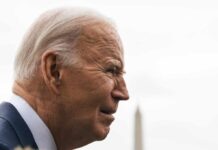
President Trump’s sale of “Trump 2028” merchandise has sent shockwaves through the Republican Party, freezing potential presidential hopefuls in their tracks despite constitutional barriers to a third term.
At a Glance
- President Trump is selling “Trump 2028” merchandise despite the 22nd Amendment’s prohibition against serving more than two terms as president
- Potential Republican candidates for 2028 including JD Vance, Marco Rubio, and Ron DeSantis are hesitant to make moves until Trump clarifies his intentions
- Constitutional experts affirm Trump cannot legally serve a third term without an amendment, which is highly unlikely
- Trump’s third-term talk appears to be a strategic move to maintain influence within the Republican Party
- Trump has significant control over the Republican National Committee and maintains powerful endorsement leverage
Constitutional Roadblocks to a Third Term
The 22nd Amendment clearly states that no person can be elected to the presidency more than twice, creating an unmovable barrier to President Trump’s potential third term ambitions. Despite this constitutional limitation, Trump has suggested there might be ways around this restriction, remarking, “They do say there’s a way you can do it,” when referring to potential methods to circumvent the two-term limit. Legal experts universally disagree with this assertion, confirming that without a constitutional amendment, a third term would be impossible.
Some Trump supporters have floated creative interpretations, suggesting the amendment only applies to consecutive terms or that Trump could run as vice president and then assume the presidency. However, constitutional scholars dismiss these theories as legally unfounded. State election officials and courts would almost certainly prevent Trump from appearing on ballots due to the clear language of the 22nd Amendment, rendering these hypothetical scenarios moot.
— The Washington Stand (@WSHStand) July 9, 2024
Strategic Posturing and Republican Party Dynamics
The introduction of “Trump 2028” merchandise appears strategically calculated to maintain Trump’s grip on the party’s future. Former House Speaker Newt Gingrich offered insight into Trump’s approach, saying, “Don’t underestimate the degree to which he believes any Trump-centered noise is good, because it starves his opponents.” This assessment suggests the former president recognizes how his ambiguous intentions effectively freeze the field of potential Republican contenders while keeping himself at the center of political discussion.
“He’s not going to run for another term,” Newt Gingrich has stated bluntly. “Don’t underestimate the degree to which he believes any Trump-centered noise is good, because it starves his opponents.”
Senate Majority Leader John Thune has suggested Trump is merely “messing with you” when discussing a third term. Nevertheless, the impact of this messaging has tangible consequences on the party’s dynamics. Trump’s control over the Republican National Committee and his endorsement power create a political environment where potential 2028 candidates must carefully navigate their relationship with him or risk alienating his substantial base of supporters.
The Frozen Republican Field
Rising Republican stars including Vice President JD Vance, Senators Marco Rubio, Ted Cruz, Josh Hawley, and Governor Ron DeSantis find themselves in political limbo as they consider their presidential ambitions. Despite JD Vance’s advantageous position with access to resources and donor networks as vice president, he has made no observable moves toward establishing a 2028 campaign infrastructure. This standstill reflects the power Trump continues to wield over Republican presidential politics.
A congressional representative has proposed a constitutional amendment to allow Trump to run again, though the likelihood of such an amendment securing the required two-thirds majority in both chambers of Congress and ratification by three-fourths of states is virtually nonexistent. The practical impossibility of this path reinforces the view that Trump’s third-term rhetoric serves primarily as a political tool rather than a genuine attempt to extend his presidency beyond constitutional boundaries.

























